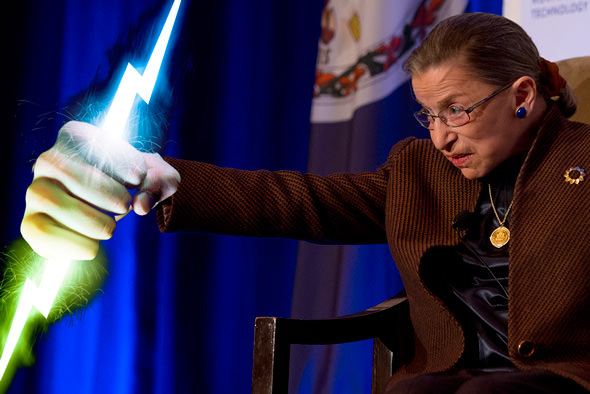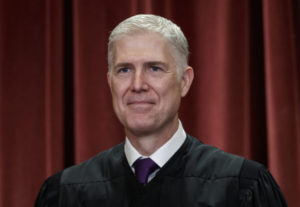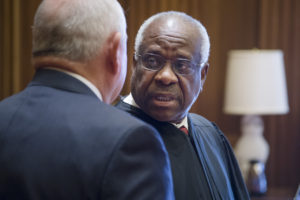The 2014 SCOTUS Awards
Who's the justice on the SCOTUS with the mostest? Read on to find out.

AP
We live in a celebrity culture, driven by personality worship and superstar veneration. And so it’s fitting that at the end of each year, we’re treated to “best-of” lists that rank and grade our luminaries and their achievements for practically everything — from the movies they make and the songs they sing to how beautiful they are, and how much wealth they’ve accumulated.
Conspicuously missing from the annual rites, however, are the nine justices of the Supreme Court, who wield more power than the mightiest Hollywood mogul and almost as much influence over the minds of our young as the latest “American Idol” winner.
To remedy this sorry state of affairs, I’ve decided to inaugurate a SCOTUS awards ceremony for the year’s “best” contributions to justice, whether accomplished on or off the bench. The only difference between these awards and those handed out at the Oscars and the Grammys is that every member of the high court gets a trophy, just like in Little League.
Here, then, are your winners:
Antonin Scalia for the Most Unhinged Public Statement: This out-of-court, out-of-wardrobe award goes to Scalia for his remarks about the constitutionality of torture. In an interview with the Swiss news network RTS a day after the release of the Senate torture report, Scalia said that although the U.S. has statutes that bar torture, “the Constitution itself says nothing about torture.” Channeling his best Dick Cheney, Scalia invoked the specter of the ticking nuclear time bomb, chiding American and European liberals who would rule out torturing terror suspects to locate and disarm such a doomsday device for being “self-righteous.” What he didn’t tell his Swiss audience is that the Supreme Court has held torture to be unconstitutional under the Eighth Amendment since the 1878 case of Wilkerson v. Utah.
John Roberts for the Best Slippery Slope Opinion: Back in 1976 in the case of Buckley v. Valeo, the Supreme Court announced the first of several post-Watergate decisions on campaign finance in which the expenditure of money on politics was equated with free speech. Over time, the equation created a slippery slope that eventually led to 2010’s landmark ruling in Citizens United and April’s 5-4 majority opinion in McCutcheon v. FEC. Authored by Chief Justice Roberts, McCutcheon extended the meme of money as speech, striking down the aggregate biennial limits on the money individuals can contribute to federal candidates, parties and PACs. The decision left intact — at least until the next rung on the slope — limits on the amount of money people can give to any single candidate.
Clarence Thomas for the Best Why Stop Now Opinions: Thomas may be ridiculed for his refusal to ask questions during oral arguments, but his written opinions are no laughing matter, especially his concurrences, in which he feels free to really let his hair down. Two such masterpieces stood out in 2014: McCutcheon, in which Thomas argued that all campaign contribution limits should be abolished, and Town of Greece v. Galloway, in which the court majority upheld a small New York town’s practice of opening monthly board meetings with a Christian prayer. In his separate Galloway opinion, Thomas argued that the First Amendment’s Establishment Clause separating church and state should not apply to states and their subdivisions at all.
Anthony Kennedy for Best Center-Right Swinger: Often referred to as the court’s “swing justice” and the “influential man in the middle,” Kennedy’s swinging lists more often to the right. In 2014, he wrote the majority opinion in Galloway, holding that the town of Greece “does not violate the First Amendment by opening its meetings with prayer that comports with our tradition and does not coerce participation by nonadherents.” And in the Hobby Lobby case, decided on the last day of the 2013-2014 term, he crafted a concurrence in which he sought to reassure the nation’s women that the majority’s decision really was limited in scope because the federal government could step in to pick up the health insurance tab for birth control that religious companies refuse to pay.
Samuel Alito for Wielding the Biggest Gavel: No longer content to play a junior role in support of his right-wing brethren, Sammy “the Hammer” Alito, as he is known in some circles, found his voice, writing the majority opinions in both Hobby Lobby and Harris v. Quinn. The former established the religious personhood of closely held corporations and upheld their faith-based right to deny female employees health insurance coverage for contraception. Quinn dealt a body blow to public employee unions, holding that the First Amendment right to freedom of association prohibits the collection of agency “fair-share” fees from government workers who elect not to join unions that nonetheless negotiate on their behalf.
Stephen Breyer for Best Center-Left Swinger: A member of the court’s liberal bloc of four, Breyer sometimes takes principled progressive positions, as he did dissenting in McCutcheon, warning that the majority’s opinion would leave only a “remnant” of campaign finance laws that would be “incapable of dealing with the grave problems of democratic legitimacy that those laws were intended to resolve.” Swinging in the opposite direction, however, he wrote a concurrence in Schuette v. BAMN, endorsing the constitutionality of Michigan’s ban on affirmative action.
Sonia Sotomayor for Best Opinion on Life in the Real World: In response to the court’s 6-2 ruling in Schuette (in which Justice Elena Kagan recused herself) that it was constitutionally permissible for Michigan voters to ban affirmative action, Sotomayor penned a masterful dissent. In it, she schooled the majority (including Thomas) on the racial realities of contemporary America, reminding it over and over again that “race matters,” not only because of persistent racial inequality but “for reasons that really are only skin deep, that cannot be discussed any other way, and that cannot be wished away.”
Elena Kagan for Best Ruth Bader Ginsburg in Training: Usually casting her votes with her liberal cohort, Kagan stood up to the gun lobby in Abramski v. United States, writing a 5-4 majority opinion that upheld a criminal conviction under the Gun Control Act of 1968 for a “straw purchase” that failed to disclose the identity of the actual buyer of a firearm. She also joined the dissents in Quinn and Hobby Lobby.
Ruth Bader Ginsburg for Being the Nation’s Best Jewish Mother: She’s 81 years old. She walks like she’s about to keel over, and she has endured both colon and pancreatic cancer and more recently, heart surgery. But Ginsburg continues, in the best tradition of Jewish mothers — and mothers of all ethnicities — to serve as the conscience of the court. Sadly, as has happened so often during her long tenure, much of her best work in 2014 was performed in dissent, such as her withering critique of Alito’s majority opinion in Hobby Lobby. “In a decision of startling breadth,” she wrote, “the Court holds that commercial enterprises, including corporations, along with partnerships and sole proprietorships, can opt out of any law (saving only tax laws) they judge incompatible with their sincerely held religious beliefs.”
As the curtain falls on 2014, please join me in looking back at the hard work of our winners and in looking forward to more of the same in 2015.
Independent journalism is under threat and overshadowed by heavily funded mainstream media.
You can help level the playing field. Become a member.
Your tax-deductible contribution keeps us digging beneath the headlines to give you thought-provoking, investigative reporting and analysis that unearths what's really happening- without compromise.
Give today to support our courageous, independent journalists.





You need to be a supporter to comment.
There are currently no responses to this article.
Be the first to respond.